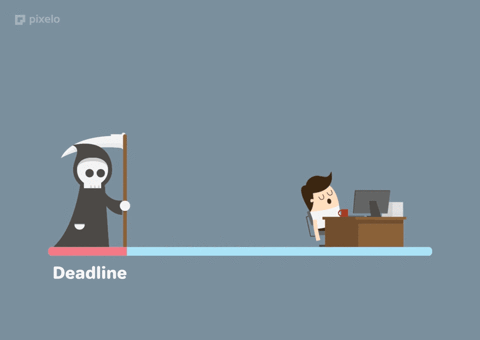“I’ll Do it Tomorrow”

Deadlines play an important role in procrastination, as they prompt the “behavioral paradox” of voluntary disregard.
January 19, 2020
Merriam Webster defines procrastination as “to put off [a task] intentionally and habitually.” However, procrastination is much more than its definition. Many are fully aware that procrastination can be both the cause and effect of self-degradation, emotional distress, and poor health. Unfortunately, procrastination is a nearly universal trend; Healthline reports that “between 75 and 85 percent of students procrastinate.” Of this percentage, some individuals procrastinate as a lifestyle.
Enge You (10) says that “I procrastinate a lot… I tell myself I’ll be able to do it later, kind of pushing it off. And it did result in a lot of stress.” Enge is among millions of high schoolers worldwide who procrastinate on schoolwork. Specifically in the US, the Association for Psychological Science (APS) found that “87% of high schoolers” admit to “procrastinating tendencies.” Reasons for procrastination vary, but the APS notes that the “increasing prevalence of phones” is among the most common “distractions” for teens and young adults.
To that 87%, procrastination can be a harmful process that directly affects everyday situations. Its harm lies in the “failure of self-regulation” observed by the APS. Such failure is the voluntary delay of work, even when fully aware of the consequence.
An obvious consequence of such behavior is a decrease in productivity and efficiency. In fact, productivity was measured in a number of surveys conducted by the APS in 2013. All surveys found, to some degree, that “students with procrastinating tendencies had lower levels of productivity” as opposed to students without.
However, there are more deep-rooted effects of procrastination that impact emotional and physical health. When procrastinators delay their work, stress levels gradually increase as the deadline approaches. Each time the task is delayed, procrastinators are left with feelings of guilt and self-degradation. Still, the task is further avoided as procrastinators seek to improve mood in the short term.
Psychologist Fuschia Siorois of Bishop’s University explains that this “behavioral paradox” is the core of why procrastination is so impacted by emotion. Procrastinators cope with negative emotions like anxiety and insecurity by improving their current moods at the expense of their futures. Thus, the cycle continues.
These habits can become a lifestyle for some, known as chronic procrastination. Chronic procrastinators exhibit self-destructive behaviors in all aspects of their lives; according to The New York Times, it can induce “chronic stress… depression, anxiety, poor health… chronic illness, and even hypertension and cardiovascular disease.”
It is important to combat such self-destructive behaviors, but it becomes difficult to directly address the issue. Joseph Ferrari of APS says that, “to tell the chronic procrastinator to just do it would be like saying to a clinically depressed person, cheer up.” Since the root of procrastination is emotion rather than time management, methods that require self-regulation (sectioning tasks, removing distraction, self-imposed deadlines) tend to fail. Instead, APS recommends counseling and the adoption of the concept of self-forgiveness. According to APA, self-forgiveness could possibly be the “best personal remedy for procrastination,” as it stresses the fact that it is a “self-inflicted wound.”























faith desio • Mar 4, 2021 at 6:44 PM
This article was very interesting and helpful! I also love your Gif image, I think it is a fun way to help visualize deadlines. Thank you for the great article!